Kentucky Say It Follows ICANN Rules in Effort to Seize Gambling Domains

The reach of ICANN's Uniform Dispute Resolution Policy (UDRP) is getting a high-profile test in an ambitious effort by Kentucky to seize the domain names of gambling Web sites for violating state law. Kentucky says only the domain owners can contest the seizure, but, by order of Franklin County Judge Thomas Wingate, the state filed a brief replying to gambling trade groups contesting Kentucky's authority. A hearing is set for Tuesday on the state's forfeiture motion.
The domain names clearly are "property" that the state can seize, the state brief said, citing court decisions dating to 1996. By violating Kentucky law, the sites have violated the UDRP -- to which all domain registrants agree -- opening themselves to seizure if their registrars do business with the state, Kentucky said.
Registrars that continue, after notice from the state, to serve domain owners breaking Kentucky gambling laws are no different from someone who gives a boat to a known cocaine smuggler, the state said. If such registrars refuse to give up the domains in question, they will be prosecuted, it said. The Justice Department has obtained domain names that were used for crimes, such as selling counterfeit software and distributing obscene material, the brief said.
Domain names didn't exist when Kentucky outlawed gambling "devices," but the law covers domain names thanks to their purpose, the state said. "It is the domain name and its use that provides the gambler the ability to gamble." The brief cited an Arkansas Supreme Court ruling that teletype machines used to relay information on horse races were gambling devices because they had been "adapted, devised or designed" for gambling purposes.
Registrars for a "large number" of the sites, including foreign registrars, already have transferred or locked domain names, which "demonstrates the validity of the Court's Seizure Order," the state said. Courts have ruled in several federal drug cases that property elsewhere can be seized by the U.S. without "constructive control" over that property, the brief said. The defendants are located abroad precisely "to avoid the effective exercise of [the state's] jurisdiction."
The state's analysis is voided by federal law, said a brief filed by the Interactive Media Entertainment and Gaming Association. The Anticybersquatting Consumer Protection Act limits jurisdiction to the district in which the registrar is located, meaning Kentucky has no authority to order domains transferred from non-Kentucky registrars, iMEGA said. "Otherwise, any party that registers a domain name could be required to defend itself in any jurisdiction in the country." The Vacco decision in New York, cited by Kentucky, gave that state jurisdiction over a Delaware gambling company only because its headquarters were in New York and it explicitly targeted New Yorkers through advertising, the brief said.
The UDRP only applies to cybersquatting or "bad faith" registrations, iMEGA said. And there's no history of successful state use of the UDRP to pursue a criminal case, it said. Cybersquatting disputes are the only ones mentioned in the UDRP that require a "mandatory administrative proceeding," whereas disputes involving domain name registration are subject only to "any court, arbitration or other proceeding that may be available" -- and Kentucky's action is over Web site use, not registration, iMEGA said. The staff report for the UDRP's creation said domain name holders can be sued only in the jurisdiction of their registrar or their own jurisdiction, the group said. The state reading of the UDRP would mean a Kentucky housewife who registers a domain name to share pictures with family could be subject to Madagascar's jurisdiction, it said.
Kentucky's gambling-device law is specific about what constitutes a device, iMEGA said. The law refers to "slot machine," "drum or reel," and "roulette wheels, gambling tables and similar devices," all items mechanical in nature, the brief said. The group cited a recent federal decision in the Western District of Kentucky that a local tax on room charges for hotels couldn't be assessed on the full price collected by companies that market rooms on Hotels.com. "This Court should not accept Plaintiff's invitation to do what the legislature has elected not to do," iMEGA said.
IMEGA said Kentucky's action is barred by a wine-shipment decision in the Supreme Court that said a state can't protect its own wine industry from outside competition, opening the market for wineries to sell their products nationwide on the Internet. Kentucky Gov. Steve Beshear has defended the state action as protecting its own gambling industry, the group noted (WID Sept 24 p5). Kentucky's "legitimate local public interest" in regulating residents' access to Internet gambling also is outweighed by the disproportionate impact of the domain names' seizure "throughout the entire world," iMEGA said.
The Internet Content Association, whose members include companies that "buy and sell Internet traffic," echoed iMEGA's reading of the Kentucky law as applying only to "mechanical" devices. The domain names' status as property is far from settled in courts, ICA said, noting that the Virginia Supreme Court has said a domain owner's only interest is his "contractual right to utilize the services of a particular domain name registrar." Ken-tucky's attempt to seize the domain names is akin to a state trying to seize set equipment used by the Home Shopping Network because it's broadcast in the state, ICA said. The state reading of its authority to seize property would put domain owners at much greater risk of being dragged into court all over the U.S., the group said.
Kentucky filed a separate brief responding to one by the Poker Players Alliance seeking to have online poker declared a "game of skill" not covered by Kentucky's Internet gambling law. Kentucky law, though, defines gambling as any activity with an "element of chance," including poker, the state said. Kentucky's attorney general has said the chance in poker isn't incidental but "predominates" in the game, the state added.
Greg Piper, Washington Internet Daily













